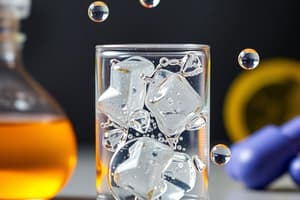Podcast
Questions and Answers
Which drying agent is considered neutral?
Which drying agent is considered neutral?
- CaCl2 (correct)
- H2SO4
- CaO
- NaOH
What type of delivery setup is appropriate for collecting dense gases such as CO2?
What type of delivery setup is appropriate for collecting dense gases such as CO2?
- Downward delivery (correct)
- Water displacement
- Upward delivery
- Direct exposure
Which acid is fully ionized in water and considered a strong acid?
Which acid is fully ionized in water and considered a strong acid?
- H3PO4
- CH3COOH
- H2SO4 (correct)
- H2CO3
What defines a weak acid in terms of ionization in water?
What defines a weak acid in terms of ionization in water?
Which of the following is NOT a strong acid?
Which of the following is NOT a strong acid?
What happens to HCl when dissolved in water?
What happens to HCl when dissolved in water?
Which drying agent is classified as alkaline?
Which drying agent is classified as alkaline?
Why is a funnel needed at the back of a setup producing NH3?
Why is a funnel needed at the back of a setup producing NH3?
What is the general formula for alkenes?
What is the general formula for alkenes?
Which of the following compounds is an example of an alkanoic acid?
Which of the following compounds is an example of an alkanoic acid?
What happens to the boiling point of compounds in a homologous series as the molecular size increases?
What happens to the boiling point of compounds in a homologous series as the molecular size increases?
What is the characteristic feature of homologous series that contributes to their similar chemical properties?
What is the characteristic feature of homologous series that contributes to their similar chemical properties?
Why are alkanes generally unreactive?
Why are alkanes generally unreactive?
What product is majorly formed when an alkane reacts with halogen in excess?
What product is majorly formed when an alkane reacts with halogen in excess?
In a homologous series, what trend occurs with volatility as molecular size increases?
In a homologous series, what trend occurs with volatility as molecular size increases?
What is a key condition required for the substitution reaction of alkanes with halogens?
What is a key condition required for the substitution reaction of alkanes with halogens?
What happens to the viscosity of petroleum fractions as the molecular size increases?
What happens to the viscosity of petroleum fractions as the molecular size increases?
Which of the following correctly describes the state of hydrocarbons with more than 18 carbon atoms?
Which of the following correctly describes the state of hydrocarbons with more than 18 carbon atoms?
During the refining process of petroleum, what occurs to the longer hydrocarbons in the furnace?
During the refining process of petroleum, what occurs to the longer hydrocarbons in the furnace?
In a fractionating tower, where do larger fractions with higher boiling points condense?
In a fractionating tower, where do larger fractions with higher boiling points condense?
Which of the following statements best describes the combustion of hydrocarbons?
Which of the following statements best describes the combustion of hydrocarbons?
What is the effect of molecular size on the volatility of hydrocarbons?
What is the effect of molecular size on the volatility of hydrocarbons?
Which property of hydrocarbons changes as their molecular size increases, leading to a sootier flame during combustion?
Which property of hydrocarbons changes as their molecular size increases, leading to a sootier flame during combustion?
What is the primary result of vaporizing petroleum at around 400°C in the refining process?
What is the primary result of vaporizing petroleum at around 400°C in the refining process?
What is the main purpose of cracking in chemistry?
What is the main purpose of cracking in chemistry?
What are the required conditions for the cracking process?
What are the required conditions for the cracking process?
How can the product gases from cracking be collected?
How can the product gases from cracking be collected?
What observable change indicates that halogen solution has reacted during substitution?
What observable change indicates that halogen solution has reacted during substitution?
What happens to the first few cm³ of gas obtained during cracking?
What happens to the first few cm³ of gas obtained during cracking?
Which of the following best describes the nature of the cracking reaction?
Which of the following best describes the nature of the cracking reaction?
What is the color of bromine in an aqueous solution?
What is the color of bromine in an aqueous solution?
What is a precaution one must take after cracking the reaction is complete?
What is a precaution one must take after cracking the reaction is complete?
What is the observable change when an alkene undergoes addition with halogen?
What is the observable change when an alkene undergoes addition with halogen?
Which compound cannot undergo addition reactions due to its extra stability?
Which compound cannot undergo addition reactions due to its extra stability?
What is required in addition with cold, dilute KMnO4/H+ to produce a diol from an alkene?
What is required in addition with cold, dilute KMnO4/H+ to produce a diol from an alkene?
When testing for unsaturation, what color change occurs when an alkene interacts with cold, dilute KMnO4/H+?
When testing for unsaturation, what color change occurs when an alkene interacts with cold, dilute KMnO4/H+?
What happens to the layers formed during an addition reaction involving aqueous halogen and an alkene?
What happens to the layers formed during an addition reaction involving aqueous halogen and an alkene?
What should NOT be used to synthesize a diol from alkenes due to potential further oxidation?
What should NOT be used to synthesize a diol from alkenes due to potential further oxidation?
What is the general outcome when an alkene reacts with halogen in an addition reaction?
What is the general outcome when an alkene reacts with halogen in an addition reaction?
If more than one double bond is present in an alkene during an addition reaction with halogen, what adjustment must be made?
If more than one double bond is present in an alkene during an addition reaction with halogen, what adjustment must be made?
Flashcards are hidden until you start studying
Study Notes
Drying Agents
- Calcium Chloride (CaCl2): Neutral drying agent, no specific acid or base preference.
- Calcium Oxide (CaO): Alkaline drying agent, ineffective for acidic gases like HCl and CO2.
- Sulfuric Acid (H2SO4): Acidic drying agent, ineffective for alkaline gases like NH3.
Common Gas Collection Set-Ups
- Upward Delivery: Suitable for lighter gases (e.g., NH3).
- Downward Delivery: Used for denser gases (e.g., CO2).
- Water Displacement: Effective for gases not soluble in water (e.g., H2).
- Precaution: A funnel is needed when producing NH3 to prevent back suction that may crack the test tube.
Acid-Base Definitions
- Neutral Definition: Acid concentration [H+] equals base concentration [OH-]; pH of 7 only at 25°C.
- Strong Acids: Fully ionize in water (e.g., HCl, HNO3, H2SO4).
- Weak Acids: Partially ionize in water (e.g., H2SO3, H2CO3).
Hydrocarbon States and Properties
- 1-4 Carbon Atoms: Exist as gases.
- 5-17 Carbon Atoms: Liquid state.
- >18 Carbon Atoms: Solid state.
- Physical Properties: Increased molecular size leads to higher boiling points, increased viscosity, decreased volatility and flammability.
Petroleum Refining Process
- Step 1: Vaporization at 400°C; small hydrocarbons become gases while larger remain liquid/solid.
- Step 2: Separation in a fractionating tower; heavier fractions settle, lighter fractions rise.
- Step 3: Fractional condensation occurs where lighter hydrocarbons condense higher in the tower.
Hydrocarbon Combustion
- Complete Combustion: Occurs with sufficient oxygen, producing CO2 and H2O.
- Incomplete Combustion: Limited oxygen results in carbon monoxide and soot production.
Homologous Series
- Definition: Family of compounds with similar chemical properties and gradual physical property changes due to increased molecular size.
- General Formulas:
- Alkanes: CnH2n+2
- Alkenes: CnH2n
- Alkanols: CnH2n+1OH
- Alkanoic Acids: CnH2n+1COOH
Chemical Reactions of Alkanes
- Combustion and Substitution: Generally unreactive due to strong C-H and C-C bonds.
- Substitution with Halogens: Requires UV light or heat to initiate bond breaking with varying products based on halogen excess.
Chemical Reactions of Alkenes
- Cracking: Breaking down larger molecules into smaller ones under high temperature and absence of air; collected via water displacement.
- Addition Reactions: Test for unsaturation.
- With Halogens: Observable color change from halogen solution to colorless upon reaction.
- With Cold, Dilute KMnO4/H+: Purple to colorless, indicating unsaturation.
Precautions in Reactions
- Heat catalyst instead of paraffin to avoid rapid vaporization.
- Discard initial gas to eliminate atmospheric air contamination.
- Remove delivery tube before stopping heat to prevent back suction of water.
Summary of Chemical Testing
- Unsaturation Test: Only alkenes change the color of KMnO4 from purple to colorless; reactions produce diols under basic conditions without further oxidation interference.
Studying That Suits You
Use AI to generate personalized quizzes and flashcards to suit your learning preferences.




